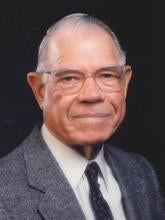Oliver Johnson (1923-2000)
Education
B.A., Linfield College
M.A. and Ph.D., Yale University
Areas of Interest
Ethics; Normative and metaethics; Epistemology
Profile
After doing graduate work in philosophy at the University of Oregon and later at Oxford University in England, Oliver A. Johnson received his M.A. (1950) and his Ph.D. (1951) from Yale University, writing under Brand Blanchard, one of America’s leading philosophers of that period. In July 1953 he joined the faculty at the University of California, Riverside, as an assistant professor and charter member of the faculty, one year before the campus opened in the fall of 1954. In 1965 he was promoted to full professor.
Dr. Johnson concentrated on fundamental philosophic issues, establishing an international reputation for his work in ethics and epistemology. He argued for the rule of reason in ethics and sought clarity, rigor and lucid exposition in his views on epistemology. His work in ethics concerned two topics: normative ethics and metaethics. In his writings, he articulated a conception of morality in which, for any individual living in a society, to act morally is the same as to act rationally. Thus, the perennial practical question “Why ought I to be moral?†he argued, can be decisively answered, since it is reducible to the question “Why ought I to be rational?†His work in epistemology concerned itself with the foundations of knowledge, with special emphasis on the basic question: Is knowledge possible? In wrestling with this question he devoted much of his attention to epistemological skepticism.
Dedicated to the learning process, Oliver Johnson was an excellent teacher, challenging even introductory students by the Socratic method. He particularly enjoyed making students squirm under Socratic examination of ideas and arguing both sides of particularly knotty issues.
His outstanding record of service to his department, the campus, and the field of philosophy exemplified his commitment to the university and the profession. He chaired the department for many years and was the leader in developing philosophy holdings in the research library as well as creating a departmental library that bears his name. His Senate contributions continued after retirement as he endowed a bi-annual UC system-wide Academic Senate award to recognize the meritorious service contributions of others.
Oliver Johnson devoted himself to promoting the profession of philosophy. Perhaps his most significant service contribution was as Secretary-Treasurer of the Pacific Division of the American Philosophical Association, and as a member of the APA’s national Board of Officers, 1970-71 to 1981-82. Using these offices, Professor Johnson was instrumental in bringing the Pacific Division from the brink of dissolution to a position of influence within the profession.
Professor Johnson retired from the faculty in 1989. Following four and one-half years on kidney dialysis, he died unexpectedly of a heart attack on March 22, 2000 in Temecula, California.
Source: Carl Cranor and David Harrah, “In Memoriam: Oliver A. Johnson,†University of California Academic Senate (2000). Web: http://senate.universityofcalifornia.edu/oja/memoriam.html
Selected Publications
Rightness and Goodness (Martinus Nijhoff, 1959).
Moral Knowledge (Martinus Nijhoff, 1966).
The Moral Life (Allen & Unwin, 1969).
The Problem of Knowledge (Martinus Nijhoff, 1974).
Skepticism and Cognitivism (University of California Press, 1978).
Ignorance and Irrationality (Philosophy Documentation Center, 1980). [Refereed monograph, 97 manuscript pages, microfilm.)
